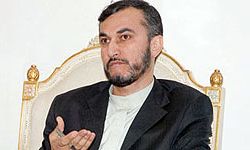
Iranian Foreign Minister Hossein Amir Abdollahian underlined the importance of elections and the high public turnout in the polls in Syria on Monday, and said the Muslim country is taking fundamental steps towards reforms.
Amir Abdollahian made the remarks after reports from Syria said that polling stations in Damascus and other cities across the country, including the volatile regions which have been the scene of deadly clashes between the security forces and terrorists in recent months, witnessed high public turnout in the Monday parliamentary elections.
He hailed the Syrian people’s massive participation in the elections, and said, “The understanding people of Syria have always seen the political solution as the most appropriate way and gave a crushing response to foreign interference and terrorist actions by participating in the parliamentary elections.”
Amir Abdollahian underscored Iran’s support for continued political reforms in Syria and confrontation against foreign intervention in the country, and said, “The Islamic Republic of Iran firmly supports Syria’s resistant people and Bashar Assad’s reforms plan.”
The Syrian people’s high turnout in elections came as the western powers and other enemies of the country sought hard to dissuade the people from voting on one hand and pave the ground for toppling President Bashar Assad’s government, on the other hand.
Observers believe that the high public turnout in the elections, which is a big step towards reforms in Syria under such situation that terrorist groups still continue their moves to undermine or, at least, overshadow the elections, is a great victory for Syria’s national will and Bashar Assad’s reforms plan.
The polling in Syria on Monday was the country’s first multi-party parliamentary elections in half a century, a move considered by analysts as a step towards victory by President Bashar Assad’s reform plan and reinvigoration of stability and security in the country.
The elections followed a referendum on a new constitution in February which allowed all political parties to run for seats in the 250-strong parliament.
In March, Assad issued a decree to hold a parliamentary election on May 7. The current parliament’s term expired in March 2011, but has been extended in accordance with the country’s new constitution.
Meantime, recent reports coming from Syria suggested that various enemy plots are underway to spoil the peace mission of the UN-Arab League Envoy, Kofi Annan, in Syria to bring the Muslim country back into turmoil and pave the way for an overthrow of Bashar al-Assad’s government.
According to reports, while Syria has strived hard to pave the ground for holding healthy parliamentary elections with a fair race among candidates, enemies of the Syrian people are exercising different plots to prevent the peaceful trend of democratic changes in the country.
These enemy states lead and back up various terrorist operations, including acts of sabotage and kidnapping, and use soft war tactics, including psychological operations and threats, through the Syrian dissident expatriates and armed groups within the country to deepen turmoil in Syria and bring Annan’s peace plan into failure as they want to see an overthrow of Bashar al-Assad’s government.
Meantime, the US has spread rumors about impending blitzkriegs on Syria in a bid to affect the government forces and make Damascus consent to a Saudi and Qatari offer for the establishment of a buffer zone.
Despite a ceasefire that took effect in Syria on April 12 and the presence of UN observers, the country has been the scene of terrorist bomb attacks in recent days.
The first group of UN observers arrived in Damascus on April 15. The observers were approved for the mission according to the UN Security Council Resolution 2042 passed on April 14.
Last week, more than 20 people were killed in blasts targeting security buildings in the city of Idlib, Northwestern Syria, as the Syrian Central Bank came under rocket propelled grenade attack overnight.
Syrian State television reported that an armed terrorist group staged an RPG attack on the Central Bank of Syria on Sabaa Bahrat Square in Damascus.
The television said the assault was a clear breach of the more than two-week-old ceasefire brokered by Annan.
The developments came a few days after Annan called for the faster deployment of UN peace observers in the Middle-Eastern country as he sees the situation on the ground still “unacceptable” due to the continued violation of his ceasefire plan by the Syrian rebel groups.
Annan has offered a six-point peace initiative which has been endorsed and implemented by the Damascus government and nation, but armed rebels supported by certain Arab rulers have repeatedly violated the terms of Annan’s plan.
Syria has been experiencing unrest since March 2011 with organized attacks by well-armed gangs against Syrian police forces and border guards being reported across the country.
Hundreds of people, including members of the security forces, have been killed, when some protest rallies turned into armed clashes.
The government blames outlaws, saboteurs, and armed terrorist groups for the deaths, stressing that the unrest is being orchestrated from abroad.
In October, calm was eventually restored in the Arab state after President Assad started a reform initiative in the country, but Israel, the US and its Arab allies are seeking hard to bring the country into chaos through any possible means. Tel Aviv, Washington and some Arab capitals have been staging various plots in the hope of stirring unrests in Syria once again.
Few West-backed hardline Arab states, including Qatar and Saudi Arabia, advocate arming Syrian rebels and calling for Assad’s departure, while the rest of the Arab and Muslim world want to see a political solution.







